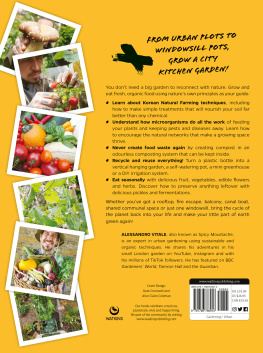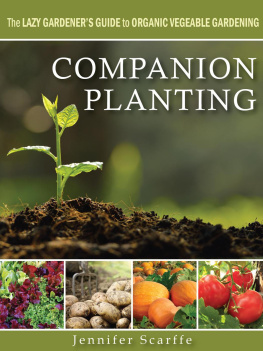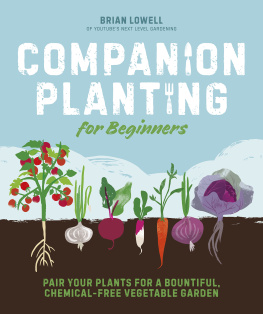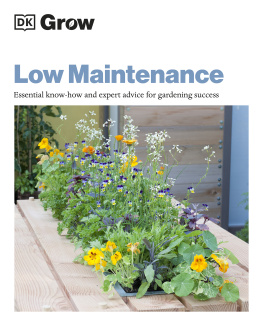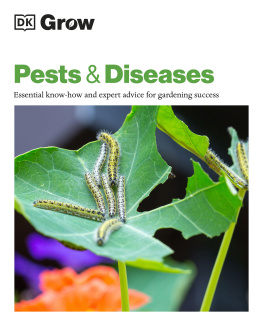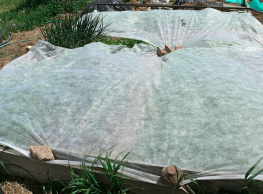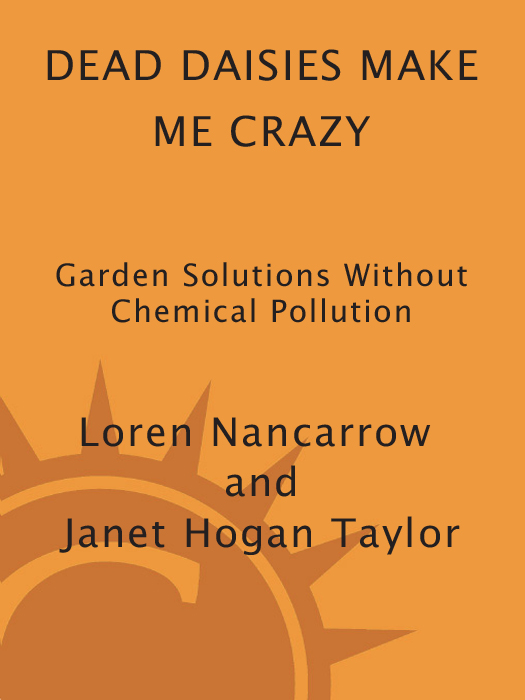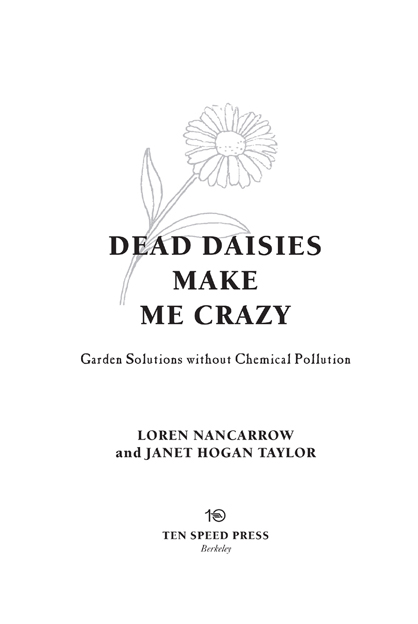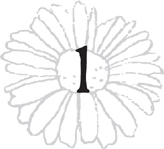O THER BOOKS BY
L OREN N ANCARROW AND J ANET H OGAN T AYLOR
Dead Snails Leave No Trails
(Ten Speed Press, 1996)
The Worm Book
(Ten Speed Press, 1998)
Copyright 2000 by Loren Nancarrow and Janet Hogan Taylor
All rights reserved.
Published in the United States by Ten Speed Press, an imprint of the Crown Publishing Group, a division of Random House, Inc., New York.
www.crownpublishing.com
www.tenspeed.com
Ten Speed Press and the Ten Speed Press colophon are registered trademarks of Random House, Inc.
Library of Congress Cataloging-in-Publication Data
Nancarrow, Loren.
Dead daisies make me crazy : garden solutions without
chemical pollution / Loren Nancarrow and Janet Hogan Taylor.
p. cm.
1. Garden pestsBiological control. 2. Plant diseases.
3. Plants, Protection of. 4. Organic gardening. I. Taylor, Janet
Hogan, 1954- II. Title
SB974.N36 2000
635.04996dc21 99-089595
eISBN: 978-0-307-78955-6
v3.1
C ONTENTS
Acknowledgments
We wish to express our gratitude to the following people: Julie Castiglia, our agent and friend; Kirsty Melville, our publisher; our familiesSusie, Graham, Hannah, and Britta; and Brian, Evan, Leah, and Suewho managed to live with us while we wrote this book; organic gardeners everywhere, who know that this is the way to go; the television and radio audiences that have given us tips and field-tested our ideas; and finally, all of our friends who have encouraged us along the way.
Thank you all!
Introduction
On a cool December morning, I sat cross-legged on the ground beneath a small citrus tree and learned something wonderful about my daughters. Hannah and Britta are just like me. They love the simple pleasures that nature can bring if allowed into our lives. As we sat and peeled small, sweet mandarin oranges we watched our local pair of roadrunners poke around under the orchard mulch looking for grubs. The girls were in heaven. The late fall crop of oranges was as full of sugar as any fruit could possibly be, and as we enjoyed our breakfast, we were also reaping the rewards of opening our little farm to nature. Too often the act of growing plants for food and pleasure sets the gardener at odds with the natural world around us. It neednt be the case. As cities grow and natural wildlife habitat shrinks, the enlightened approach to growing must include places where wildlife can share ground with us. Places where they can find food and appropriate shelter can make our gardens pleasing to the eye and provide important elements in a wildlife network.
We invite you to read along as we share our methods for growing plants without the use of inorganic chemical pesticides and fertilizers. Allow us to share methods for making and using your own blend of organic fertilizers to build the soil, thus making healthier plants. We hope to show you how you can be your own plant doctor by recognizing and correcting nutrient deficiencies. There are many ways to combat plant problems besides reaching for the quick fix in a bottle.
As you read, youll also begin to understand the habits of the beautiful butterfly sipping nectar from your flower garden. Youll understand the intricacies of the fence lizard doing pushups, and know why skunks dig little holes in your lawn. As a gardener, its likely that you spend more time outside than most people do. We hope our experiences as naturalists and gardeners will help you appreciate and embrace the fascinating landscape youve created.
We live in a push-button world. We turn on our conveniences with a button, and too often we kill what bugs us with a simple spray. As organic gardeners we are still faced with pests that compete for our harvest. But because we believe that chemical pollution has harmed our environment, we have come up with a variety of clever methods to deal with insect and animal pests while keeping the air, water, and ground around our homes poison-free. Ninety-five percent of all the bugs in your yard are good guys, there to help you. As you read this book we believe youll be better empowered to understand the delicate relationship we have with nature. Youll learn to participate in nature without destroying this important balance. Gardening in an organic, chemical-free way, youll give back to our environment that has given us so much.
Loren Nancarrow
Why Organic?
When we talk about organic we are talking about a method of working with nature and natural products to improve the soil and the environment we live in. Artificially produced fertilizers and pesticides have been cited as the two major soil pollutants in this country. The point is to build soil health so that plants will become stronger and resistant to pests and diseases, and people wont have to apply more chemicals to control them.
The real problem now facing us is how to stop our dependency on synthetic substances. How do we find that balance in nature again?
O UR I MPACT ON THE F OOD S UPPLY
One of the issues we have to address is our food supply. Can we live with tiny blemishes on the produce we buy in order to have a healthier environment? The Environmental Working Group, an environmental research group based in Washington, D.C., compiled this list showing the produce on the marketplace today that has the most and least pesticide residues.
| Least pesticide residue | Most pesticide residue |
| Avocados | Apples |
| Bananas | Apricots |
| Broccoli | Bell peppers |
| Brussels sprouts | Cantaloupe (Mexican grown) |
| Cauliflower | Celery |
| Corn | Cherries (U.S. grown) |
| Grapes (U.S. grown) | Cucumbers |
| Onions | Grapes (Chilean grown) |
| Plums | Peaches |
| Sweet potatoes | Spinach |
| Watermelon | Strawberries |
In this country, the publics insistence on perfect, unblemished produce and the economic necessity of high yields have trapped many farmers in the chemical cycle. But farmers are learning that synthetic fertilizers do nothing to benefit the soil in the long run. Many fertilizers actually do more harm than good by depositing excessive salts and contaminants in the soil. Pesticides used to stop crop-eating insects also destroy the microscopic organisms and earthworms in the soil that provide nutrients for the plants. And finally, all of these chemicals poured on the soil are leaching out into our drinking water for all of us to drink.
B UILDING G OOD S OIL
Thankfully, the damage done to our soil can be reversed. It may take some time, but it can be done. Soil has a balance, and knowing that balance and working to achieve it is the first step. We must understand that soil is a complex system of life, minerals, energy, and elements. Any one of these things out of balance damages our soil. When our soil is in balance and we mix it with sunlight and water, wonderful things can start to grow.



